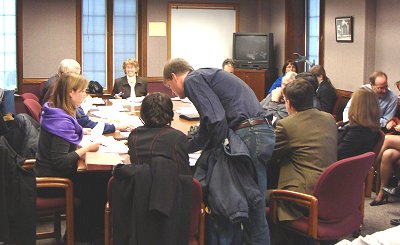- By Dan Veaner
- News
 Print
Print 
AES Cayuga
"The comments that have been made have been very important," she said. "We have said already that we will reopen negotiations before June of this year. I am personally committing to taking all the comments in mind about the process, the information we gather in order to establish our negotiating position. We'll look harder at what the process has been so far on the IDA side, and we need to continue to improve this process."

AES Cayuga Plant Manage Jerry Goodenough talking
with Tompkins County IDA attorney Mariette Geldenhuys
The PILOT was put in place to lock in assessment valuation of the plant over the first five years of the 20 year agreement. The purpose provide stability for the company and for taxing authorities to plan financially for the future. Because of the severe economic downturn the agreement was reopened only about a month after the original one was signed. The impact on Lansing schools, which gets about 20% of its budget from taxes generated by the plant, will be a half million dollars this year, not counting the additional $300,000 it would have gained in addition to this year's amount had the agreement remained unchanged.

Jeff Furman
"The school district and the Town were fully invited to participate," Robertson said. "They got minutes of every meeting. They got agendas of every meeting. They were invited to every meeting. I don't know why they thought they weren't sitting at the table with the same status as everyone else. From my point of view they were part of the negotiations."
At Monday's school board meeting Superintendent Stephen Grimm challenged the inference that district officials hadn't engaged in the process.
"I just want to say publicly there were only three meetings," he said. "We went to two of them. We were dissuaded from going to one because it was about minute financial crunching. This summer I will be at all of them, even if there are only three. If there are only three scheduled then I will request more, because I know it's going to take a lot longer than that for me to understand the complex formula that they use to project the model that (assesses the power plant at) $255 million in one month and $100 million in the other. It just doesn't work that way."
With the most to lose, school district participation has been a controversial point during the renegotiation process. But while the district sets the tax levy (the amount of the budget that comes from taxes) and the tax rate (the amount per thousand dollars of valuation a property owner will pay), it is the County that is responsible for valuing properties. That is true of private homes as well as businesses, and it encompasses regular taxpayers as well as those who negotiate PILOT agreements.
"They're not involved in the assessment, because we assess from the County point of view," said IDA member Jim Dennis. "In other districts where everyone has their own elected assessors they do get involved in individual taxing jurisdictions. So I don't see how Lansing or anybody else has been put upon by not being involved in the process, because they don't make their own assessment anyway -- the County makes the assessment."
Furman also challenged the evaluation process, and the 'stepping' down of the valuation by $30 million the first year, and $10 million in the following three years. He suggested that if the renegotiated agreement passed that the County help the school district by stepping its payments by $15 million per year, eventually getting its money back in the fourth year. He also suggested that more experts be tapped to inform the IDA during future negotiations.

Martha Robertson
"In terms of whether this went down in an equitable manner I can tell you that it was literally a negotiation," Robertson said. "There was evidence for other numbers than are here. The people at the table were all concerned with this issue, and we did the best that we could given the evidence. There is a lot of information on this: the price of energy, the amount of energy that was sold, the price of coal -- those are the main drivers. I feel confident that we have done the best we possibly could to come to an agreement where both sides felt they had done the best that they could do."
Some board members had been under the misconception that Tompkins County Department of Assessment Director Jay Franklin would be forced to assign a value to the plant by March 1st (next Monday) if the IDA did not pass the agreement. Attorney Mariette Geldenhuys explained that if the new agreement did not pass that the old one would stay in effect. Instead of going from $160 million to $100 million over the next four years the value of the plant would rise to $255 million. Geldenhuys said the reason the IDA was voting this week is that next Monday is the deadline for setting assessments, so the change could not be applied to the next tax bill if it were ratified after that.
The existing PILOT would remain in effect," she said. "The fact that the emergency provision was invoked to start negotiations doesn't change the agreement or invalidate it."
After an hour of debate the PILOT was approved 6-1 with Furman dissenting. IDA members Nathan Shinagawa and Larry Baum said that the IDA must keep abreast of market changes impacting the plant as they go into the next rounds of negotiations.
"I appreciate the effort that was put in by the Town and the School and the County during this negotiation process," said AES Cayuga Plant Manager Jerry Goodenough. "I appreciate everybody really taking the time to understand this."
----
v6i8



